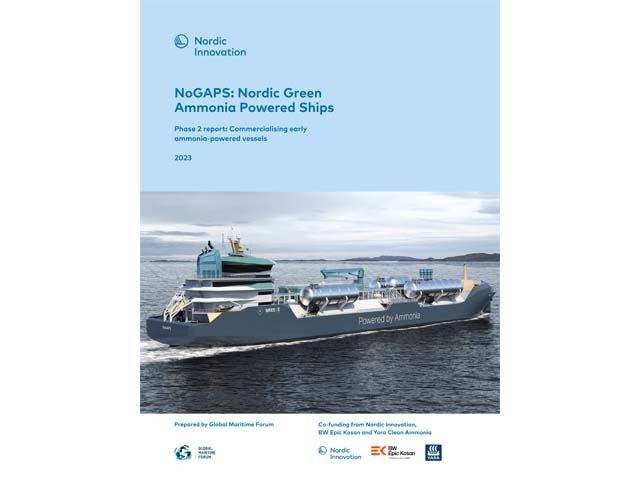A new analysis from the Global Maritime Forum has found that the cost gap between operating ships on zero-emission ammonia and conventional fuel could be closed before 2030 and possibly as early as 2026.
Ammonia is increasingly seen as an important solution for decarbonising the shipping sector, given its high scalability and potential for use on long-distance shipping routes. For the time being, however, ammonia-powered gas carriers are seen as significantly more expensive to own and operate than conventional gas carriers.
As part of the Nordic Green Ammonia Powered Ships (NoGAPS) project, co-funded by Nordic Innovation, a new study from the Global Maritime Forum explores options for addressing those cost concerns. The analysis looked at the pathways for commercialising early ammonia-powered vessels like NoGAPS – an ammonia-powered gas carrier designed to operate between the US Gulf and Northwestern Europe that has been awarded Approval in Principle from DNV. It found several measures that could significantly reduce the current cost delta between ammonia and conventional fuel and reduce commercial risks for NoGAPS and similar projects.
Jesse Fahnestock, Project Director, Global Maritime Forum, said: ‘’Since 2020, the NoGAPS project has brought together key industry leaders to progress an ammonia-powered gas tanker concept towards real-world implementation. With the completion of this latest project phase, we not only have a detailed ship design that could be used for a shipyard tender but also a feasible commercialisation pathways. We hope this boosts confidence amongst charter parties and investors to take steps towards the realisation of NoGAPS and other ammonia-powered vessels.”
Reducing the elevated costs and related commercial risks of early ammonia-powered vessels is currently the primary barrier to finding suitable and competitive finance for projects like NoGAPS. The new analysis identifies several methods for responding to this challenge. These include dual-fuel vessel design (i.e. the ability for a vessel to run on conventional fuels as well as ammonia), competitive debt financing arrangements, operational efficiencies, fuel subsidies, and governmental regulation. The US Inflation Reduction Act (IRA) and the EU’s Fit for 55 Package, for example, would reduce the cost of owning and operating NoGAPS by 20% and 10%, respectively.
The most effective way to reduce the cost gap between ammonia and conventional fuel is to pull on numerous cost-reduction levers simultaneously. For example, in a scenario in which NoGAPS runs on a route between the US Gulf and Northwestern Europe, exclusively bunkers US ammonia, applies Fit for 55 measures and IRA subsidies, and maximises operational efficiencies, the cost gap could be closed as early as 2026 and the vessel could also approach cost parity by 2030.
The NoGAPS project brings together leading players from the Nordic shipping and energy value chain: Yara Clean Ammonia, BW Epic Kosan, MAN Energy Solutions, Wärtsilä, DNV, Mærsk Mc-Kinney Møller Center for Zero Carbon Shipping, and the Global Maritime Forum as leading partners; with support from Danish Maritime Authority as the flag representative and Breeze Ship Design as the ship designer.
Murali Srinivasan, SVP Commercial, Yara Clean Ammonia, said: “We are delighted to see the successful completion of the NoGAPS project. The ship design and outline of commercialisation options are important milestones that we believe could contribute to accelerating the acceptance of clean ammonia as a zero-emission fuel. Yara Clean Ammonia’s collaboration with NoGAPS is yet another example of our commitment to developing clean ammonia as credible zero-emission shipping fuel.”
Thomas Wøidemann, BW Epic Kosan Commercial Director, said: “We have been a strong supporter of the NoGAPS project since it began in 2020. For BW Epic Kosan, with a fleet of over 60 vessels, participating in the NoGAPS project has given us greater business and technical insights into the safe management of ammonia, especially during transition. By understanding how to manage ammonia propulsion and how commercial viability can be achieved, BW Epic Kosan is well-positioned to manage new forms of alternative propulsion as we move to a lower-carbon world.”
Claus Graugaard, CTO, Onboard Vessel Solutions, Mærsk Mc-Kinney Møller Center for Zero Carbon Shipping, said: “The NoGAPS project has from day one set out to explore the commercial and technical opportunities of introducing early mover low emission shipping services. Bringing together leading industry players to innovate and qualify technical, safety and commercial viability for asset deployment has proven its strength and ability to develop solutions for the new future of shipping.”



